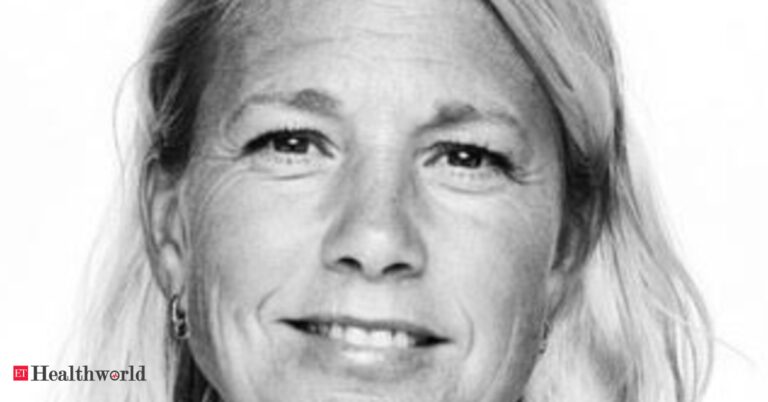
 Shahid Akhter, editor, ETHealthworld, spoke to Cecilia Oskarsson, Swedish Trade Commissioner to India to know more about the cross country collaboration in the healthcare ecosystem.
Shahid Akhter, editor, ETHealthworld, spoke to Cecilia Oskarsson, Swedish Trade Commissioner to India to know more about the cross country collaboration in the healthcare ecosystem.
Insight on the vision of developing and expanding the Sweden-India Healthcare ecosystem.
The India-Sweden Healthcare Innovation Centre has been created with the vision to create an ecosystem of open innovation towards solving healthcare challenges in the country. The Centre is a collaboration between the All India Institute of Medical Sciences (Delhi), All India Institute of Medical Sciences (Jodhpur) and the Swedish Trade Commissioner’s Office in India. The Centre works under the guidance of a Governing Council which includes the Ministry of Health and Family Welfare (India), Ministry of Health and Social Affairs (Sweden), ICMR, Knowledge and Technology Partners like AstraZeneca and NASSCOM.
Capability building, creating new models of working and supporting frugal innovations are the key pillars of the Innovation Centre and at the Centre we are working constantly to enhance these areas through the cross-country collaboration.
How is Sweden aiming to gear up the capabilities of the healthcare ecosystem in India?
The Centre was formed as part of a long-standing and very successful MoU between Sweden and India. This is also a natural progression of the Joint Innovation Partnership agreed upon by the leaders of the two nations in 2018. The aim is to work with and better the existing healthcare systems in India but not to recreate somethings that are already existing. To enable the boarder vision and to create a collaborative approach, we have partnered with existing innovation ecosystem players in India like Startup India, Atal Innovation Mission, NASSCOM and CCAMP and are working with them to further strengthen the innovation ecosystem in the country. Through the Innovation Centre, Startups from India are receiving Mentorship support from AstraZeneca’s global A-Catalyst Network and access to international markets and its network of Healthcare Innovation Hubs.
How do you intend to implement and scale up programs such as Skill for Scale, in India?
The Skill for Scale program has been rolled out as an E-module so as to enable Nurses from all across the country to enrol into it. This program is also being endorsed by the Directorate General of Health Services (DGHS). We will take the support of the partners like DGHS and Indian Nursing Council to do a state-wise roll-out of the program to enable it to reach a larger audience. We will continue to strengthen this program by updating the curriculum and adding other key non communicable diseases into the training modules to continuously up the skill level of the nurses.
How can diabetes be managed and prevented through the Skill for Scale initiative?
Nurses constitute the largest healthcare human resource at all levels of the healthcare delivery system including Primary, Secondary and Tertiary health care settings. The model of the Nurses training program has been well established and found to be empirically effective in the management of chronic illnesses like diabetes. Many countries have found that Nurses training for diabetes care model was associated with increased anti-diabetic treatment initiation rates in Primary care and improvement in glycaemic control. Hence, this education for diabetes can help in reducing the disease burden of diabetes and improve patient reported outcomes significantly.
How does the project bring awareness regarding the challenges faced by cancer patients and comprehensive cancer care?
Cancer is a very stressful disease impacting the quality of life of not only patients but also the caregivers. The challenge with cancer is the adherence to the treatment is very poor in India because of the lack of awareness in the treatment options. Our holistic approach helps in addressing some of these challenges by creating a counselling system to address different needs of the cancer patient like Nutrition, Psychology etc. With this program, an improvement in the Quality of Life in cancer patients from the time of enrolment to the follow-up time points is expected which will help create awareness. Apart from supportive care services, the Comprehensive Cancer Patient Support Services (CCPSS) program will provide information and motivation to cancer patients to help them to understand and manage their disease, well-being, psychosocial issues, and prognosis.
What are the key aspects of the Oncology Centre of Excellence?
The Supportive Care Services of the Centre of Excellence include Psychological counselling, Nutritional counselling, Physical therapy and rehabilitation along with Palliative and social welfare. All these counselling’s are being provided by trained experts in those specific areas under the guidance of AIIMS Jodhpur faculty. Individual feedbacks are also being collected to track the effectiveness of each of these sessions.